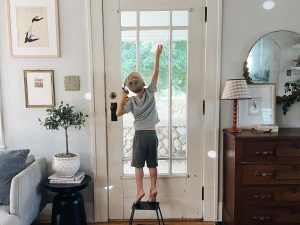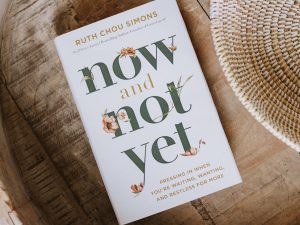We’re staying home right now to lessen the impacts of COVID-19 on our communities and health care systems, but there’s a secondary health effect of this pandemic that you are probably feeling.
Stress.
The anxiety we have over a distressed economy, school closures and the need to physically distance ourselves from others can result in stress-related health conditions.
Dr. Nadine Burke Harris is working to draw attention to these stress effects.
Appointed as California’s first-ever Surgeon General in 2019, Dr. Burke Harris’ career has been dedicated to serving vulnerable communities and combating the root causes of health disparities.
After completing her residency at Stanford, she founded a clinic in Bayview Hunters Point, one of San Francisco’s most underserved communities. She identified Adverse Childhood Experiences as a major risk factor affecting the health of her patients and later founded the Center for Youth Wellness. She also founded and led a Bay Area consortium to advance scientific screening and treatment of toxic stress.
Dr. Burke Harris’ TED Talk—titled “How childhood trauma affects health across the lifetime”—has been viewed more than 6 million times, and she wrote a book on the topic as well.
Now, she’s released the California Surgeon General’s Playbook on Stress Relief during COVID-19. There’s one for adults and another on what to look for in our kids.
It is a simple guide to what you can do every day, at home, to help support your mental and physical health using six key strategies, and she recently appeared on the Do Gooders Podcast to share more.
Christin Thieme: We’re all in the midst of taking action to lessen the impact of COVID-19 on our communities and our health care systems, but you’ve also been working to draw attention to secondary health effects of this pandemic. Can you share more?
Dr. Nadine Burke Harris: Yeah, absolutely. I think that everyone has been feeling a little bit more stress lately. One of the things that we recognize is that the stress from the pandemic, as well as for many people the economic distress that they’re experiencing right now as so many people are losing their jobs or not able to work. On top of that, the disruption to all of our routines and having kids at home, and for those who are fortunate enough to be working, trying to work while you’ve got kids at home who are trying to learn. It’s a lot.
I think that while we recognize that everyone’s having a different experience, for many people this is a really stressful time. For some people, it really even crosses the border into being traumatic. The Surgeon General’s Playbook on Stress Relief During COVID-19 was developed with the recognition that people are experiencing a heightened level of stress right now. What we recognize is that our stress levels really affect our health, our physical health, our mental health, our emotional health, and we wanted to provide some evidence-based resources and support for what folks can do to help themselves during this time.
Can you give us an overview of what’s inside that playbook and what you’re hoping it provides for people?
Sure. Part of the piece that was really important for us to recognize was for those folks who are feeling more stressed right now, maybe a little bit more grouchy and maybe having a harder time resisting those potato chips or the cookies, that it’s not just all in your head and that when we experience heightened level of stress, it’s actually our bodies making stress hormones. Stress hormones like adrenaline and cortisol can show up in our health and in our behavior in different ways. But some of the things that we recommend are just starting by checking in to see how stress shows up for you. For some people, they’ll have difficulty sleeping, for some people they may notice that they’re more irritable, for some people it’s going to really show up in their appetite, or for some people they’ll have a harder time controlling their diabetes, or their high blood pressure. That’s something that is actually, when you look at the research, there is a really common increase in things like blood sugar and blood pressure after natural disasters because that’s the body’s stress response at work.
So some of the things that we include are really evidence-based strategies to regulate the amount of stress hormones that the body makes, like exercise. Exercise is one of the most important things. Thirty to 60 minutes of exercise a day can help burn up those stress hormones and help release healthy hormones that support our mood and help counteract the effects of stress. So that’s really important.
Another important thing is sticking to our regular routines. Sleep is a really important piece of it, and even though our schedules are a bit disrupted right now, it’s still really important to go to bed at the same time in the evening and kind of wake up at the same time in the morning. The reason for that is not just because you know it’s good practice, but also because when we go to bed and wake up at the same time each day we’re actually training our brain. While we’re sleeping at night, our stress response is resetting itself. So when we change our sleep schedule, it actually can lead to the release of greater amounts of stress hormones. So believe it or not, going to bed at the same time each night and waking up at the same time each morning is an important part of helping our bodies regulate the stress response. Those are just two.
We also talk about things like mindfulness. Mindfulness is a really great one. Our stress response is the fight or flight response. That’s the sympathetic nervous system. When we practice mindfulness, whether it’s downloading a mindfulness app on your smartphone or going online to a mindfulness practice, one of the things it does is strengthens the part of the brain and nervous system called the parasympathetic nervous system. It’s the resting and digesting nervous system and it counterbalances the fight or flight response. When we strengthen that resting and digesting nervous system, it allows us to be able to come into better balance when we’re experiencing higher levels of stress. Those are just a couple. There’s more in the Surgeon General’s playbook, but we really wanted to share these evidence-based strategies.
The guide includes six key strategies for dealing with stress and self-care templates with ideas for each strategy. Could you share one tip for how to better implement these in our lives right now, starting with supportive relationships?
So for supportive relationships, a great thing is just reaching out to a friend or a family member by phone or by FaceTime. Some folks are doing FaceTime dates with their girlfriends or their guy friends. Stay connected to the people that we love.
Exercise?
Indoor dance party. That’s a really fun one. That’s my favorite. That’s what I do with my kids.
That sounds good. How about sleep?
Sleep is keeping that regular sleep schedule, going to bed, and waking up the same time each day.
Okay. Nutrition?
Avoid high sugar, high-fat foods, which seems to be mostly what we’re craving right now, and consume more foods with omega-3 fatty acids like fish and nuts.
How about mental health support?
Now is a great time to reach out to a mental health provider. There are lots of resources that are out there. I would say for anyone who’s ever thought about therapy or contemplated therapy, now would be a great time to reach out and contact a therapist, and many of them are doing visits by phone or by FaceTime.
You touched on this, how about mindfulness?
It is a great time to download a mindfulness app on your phone. There are so many different ways to do it. Headspace is one that’s very popular and they are also doing lots of promotions right now and have a lot of resources that are available for free. So that would be one I recommend.
We’ll link to that guide. It has all of the different tips and strategies for bringing each of these six strategies into our lives right now. What has been working for you personally in dealing with the stress of this crisis?
You know, honestly, I do all of the above. I got up early this morning and I did my big workout. One of the other things that’s been helping me is a recognition that we have to give some respect to the fact that this is an extraordinary time. I think for those of us who are feeling a little bit stressed out or a little bit overwhelmed, there’s a moment of like, oh my gosh, why am I feeling like this? It’s like, well, this is a really exceptional time and so we have to give ourselves a break. I try to practice that self-compassion and give myself a break.
The other thing I do with my kids are daily gratitudes. Every evening before dinner with my kids, we just go around and say a couple of things that we’re grateful for, just to help us focus on the things that are going right even though there are so many things that are a little topsy-turvy right now.
And what about our kids? Does stress feel differently for them than it does for adults?
It certainly can. Kids have a harder time recognizing that they’re feeling stressed and being able to communicate that. Some of the cues that folks can look out for and tune into is, well, depending on the age and the developmental stage, but even babies can show changes to their sleep patterns, changes to their eating habits, they may be more fussy or cry more. For toddlers, you may see changes to their developmental milestones that you thought they had already mastered. They could be finally potty trained or thank goodness, sleeping through the night. Then, all of a sudden, you see that with the changes to our schedules and not being able to go out and all that stuff they’re back to bedwetting at night or they’re coming into your bedroom in the middle of the night.
With all kids, the most important ingredient is safe, stable, and nurturing relationships. Kids can experience some stress and make it through with our loving support. I think for school-age kids, you often also see sometimes they’ll be bouncing off the walls like my seven-year-old. Some kids you won’t necessarily see changes in their behavior, but maybe they will have tummy aches or maybe they will have headaches. Around school-aged kids you start to see more challenges, not just with behavior but sometimes they can manifest physically.
Then teenagers can be tough because sometimes they can show up as more irritable, more trouble with impulse control, a little bit more argumentative if they’re feeling stressed, or they can be more withdrawn. You really have to seek them out, check in with them and ask them what’s going on, especially because so much of their worlds can happen on social media, which, as a parent, you may not have full transparency into. So, checking in is really important for our teenagers.
Absolutely. What can we do to buffer the negative impacts of stress for our kids?
One of the most important things that we can do for our kids is something that I’ve learned from my mental health colleagues called co-regulation. This is really around when we are calm, well-balanced and a healthy presence. Our kids cue off of that because we recognize kids are super tuned in to their caregivers. It’s a really interesting thing. It’s a little counterintuitive, but our own self-care, our own ability to manage our stress and do the things for ourselves that help us to be able to be calm and present is actually one of the most important things that we can do for our kids. So, explaining to them gives us that calming presence so that we can then have these conversations and explain to them in age-appropriate language what’s going on.
I think sometimes many parents want to shy away from telling kids what’s really happening because they’re afraid that it’s going to scare them. But the reality is that kids are very observant, they see what’s going on, they see that the world is kind of a different place. This is where there is really a new normal. So, not telling kids what’s going on I think can create more confusion and stress and they can make up stories about what’s going on. So, it’s good to ask what they’ve heard, ask anything they’re worried about. Then, in simple age-appropriate language, explain what’s happening.
The next piece that I think is the most important is helping to make meaning for them. Recognize even though there are a lot of things that we can’t control, we can focus on the things that we can control. These are things like washing our hands, coughing into our elbows and making sure that we do a really good job with physical distancing and staying at least six feet away from other people. One of the things that I’ve said to my kids is, “I know being at home sucks and I know that you’d rather be at school with your friends than being at home doing distance learning, but your being at home is saving lives and I’m really proud of you.” That really helps them feel like in those moments where they’re frustrated or irritated, we recognize what they’re going through, that frustration, it’s purposeful, it’s meaningful. They’re dealing with a hassle, but it’s in service of saving lives.
You are on the front lines in your role as California’s Surgeon General. What are you seeing and what’s your day like now?
My day is pretty variable. I am spending a lot of time trying to work with other departments across the government to make sure that we’re supporting Californians and especially vulnerable Californians. So for example, on Monday I was up in Sacramento at the state operation center meeting with the governor, meeting with African American leaders from across the state by video conference and really talking about some of the data that we’re seeing that demonstrates that African Americans are having a higher death rate from COVID-19 and thinking about strategies to support our vulnerable communities.
So that’s one day. Other times, I’m working with our different departments to try and implement programs and policies. Particularly, we’ve been focused on the secondary impacts, the stress-related health outcomes, health, mental health, and behavioral outcomes, and trying to bring those resources together to support folks.
Lastly, if you could give only one piece of advice or encouragement to somebody listening on how to deal with this pandemic in their own lives, what would it be?
Be kind to yourself, that’s what I would say. I think that’s the most important thing right now, that we’re kind to ourselves and that we give ourselves a little bit of a break right now. Recognize that for those of us trying to work from home, we may be slightly less productive than we usually are. For those of us who are still going out there working in essential jobs and really out on the front lines of this pandemic, just to thank you for your service and I just think about how stressful that can be. Just be kind to yourself and give yourself some self-appreciation and self-love.
Do Good:
- If you’d like to make a monetary donation, please click here to make a gift.
- Text ‘GIVE’ to 52000 to make a $10 donation to The Salvation Army. This will automatically add a one-time donation to your next mobile phone bill.
- For information about volunteering, please visit volunteer.usawest.org.
- To learn more about how to support The Salvation Army’s relief efforts, please click here.













Comments are closed.